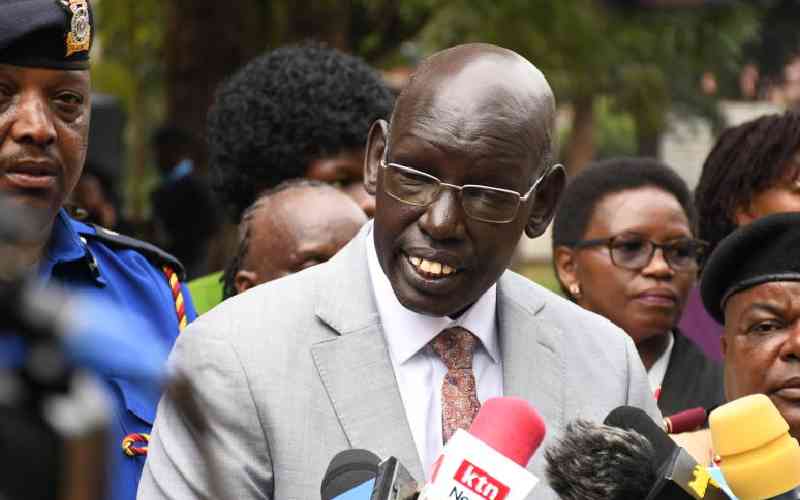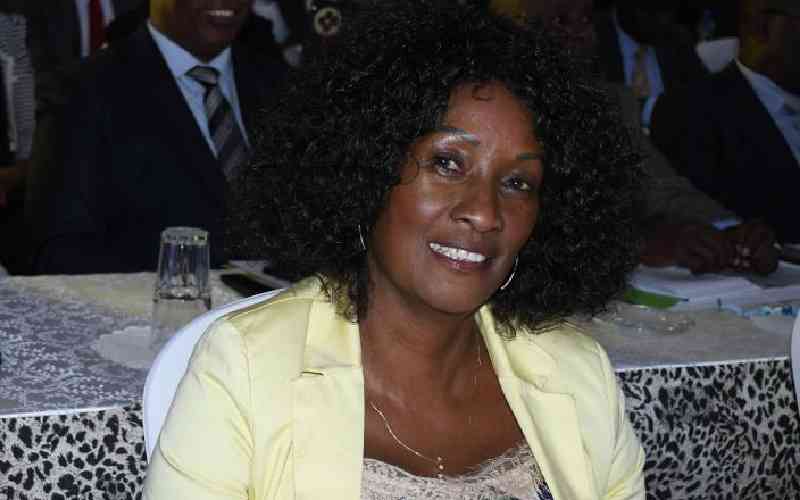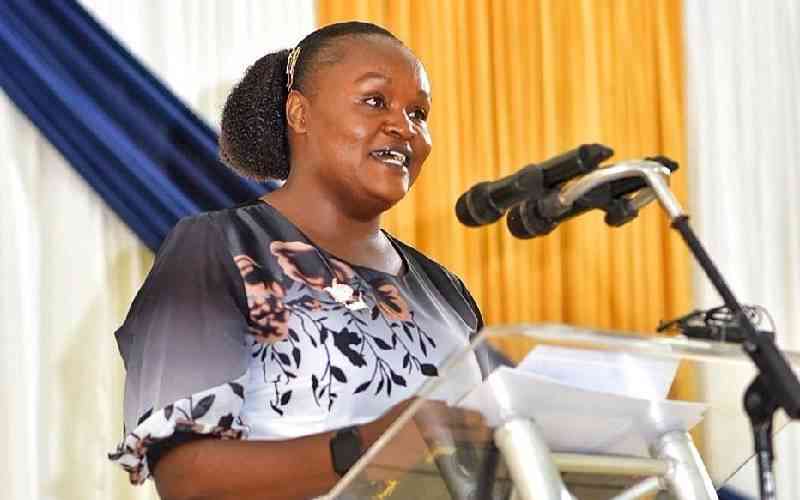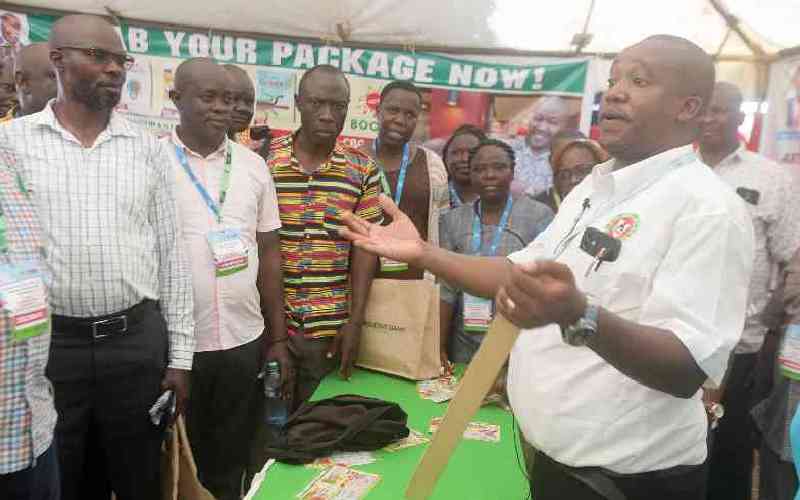
L-R: Benard Odote, Group Managing Director House of Procurement, Kadri Humal-Ayal Honorary Consul of Estonia and Benta Opande- CEO, KEWOTA during the launch of the laptop project for teachers. [Wilberforce Okwiri, Standard]
Female teachers now have an easy chance to access digital services including their pay slips, teaching content and filing tax returns thanks to a new laptops project launched on Saturday, February 25.
The laptops programme is part of three other products targeting female teachers including personal accident cover and soft loans under the 'Tuinuane Dada initiative'.
Opande said teachers will be able to own Sh70,00 laptops by only paying some Sh1, 500 per month, an initiative of Kenya Women Teachers Association (KEWOTA).
Teachers will be allowed to repay in 36 months in instalments of between Sh1,080 to Sh2,500 monthly.
KEWOTA Chief Executive Benta Opande said the laptops will have curriculum designs from nursery to secondary schools and will have some 104 digitized books that members will use to teach.
Laptops will also have a solar pot where a teacher will be able to recharge using solar energy.
In the programme, Opande said teachers will also access insurance covers that will take care of their expenses on motor accidents and personal accidents.
''The insurance cover is only for personal accidents and motor vehicles. The insurance given by the government does not cover those two yet teachers are involved in accidents every day,'' Opande said.
The CEO said these services are only available for its 90, 000 members noting that they are working to reach 230, 000 women teachers across the country.
''We have negotiated this product for our members. We give a list of our members to those institutions which are providing services to us and it's only for KEWOTA members through that unique number that they can access the services,'' she stated.
And if stolen and the teacher reports it, the laptop is switched off and anyone who tries to use it cannot gain access.
The laptops take care of the contents the teacher would like to use. Primary school teachers' laptops are different from that of secondary and teachers' colleges.
Opande said KEWOTA has partnered with the House of Procurement (HOP), associated with the Estonian Consulate, to provide digital programmes.
Speaking during the launch, Opande said, it is time for Kenya to embrace the technology world in education noting that this will go a long way to solve teachers' challenge of paperwork in their daily activities.
''A teacher will have a laptop which will have all TSC contents services and also have 104 digitalised books with current content and also a solar port where a teacher will be able to recharge using solar energy,'' she added.
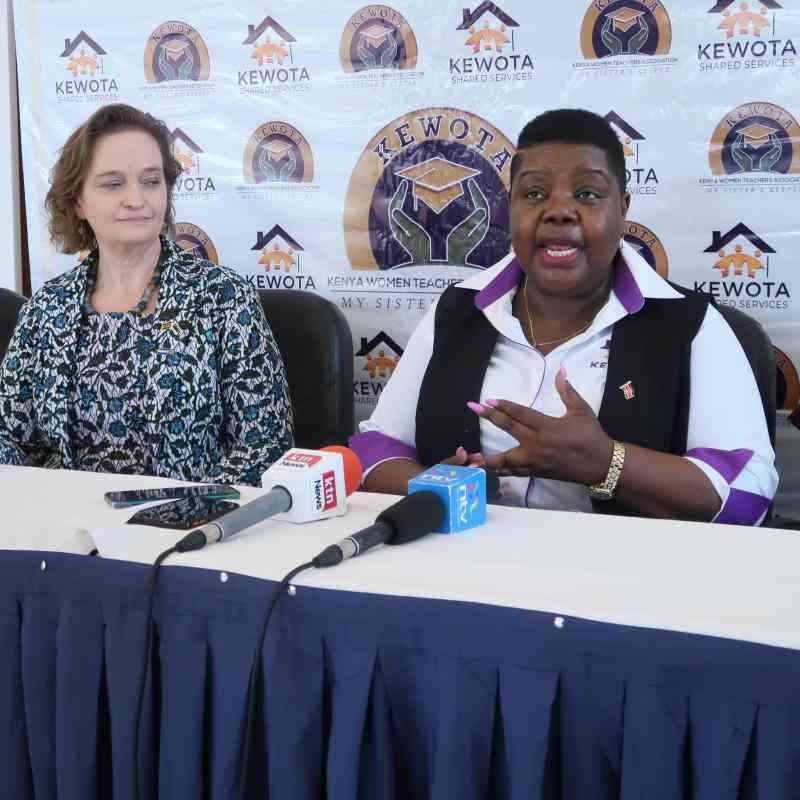
From Left: Kadri Humal-Ayal, Honorary Consul of Estonia with Benta Opande, CEO of Kenya Women Teachers Association (KEWOTA). [Wilberforce Okwiri, Standard]
Present at the event were representatives from TSC and Kenya Secondary School Heads Association (KESSHA).
KESSHA national chairman Kahi Indimuli said that with the initiative, teaching will be made easier.
He noted that during the Covid-19 pandemic, learning was conducted through mobile phones and when learning resumed, these gadgets were banned in institutions. ''The schools were on the phones, we were sending content on the phones, but immediately we opened schools we told them no phones and if found it became a case of indiscipline."
"We have to start looking for gadgets that can be used in schools by students and be able to lock any sides that we feel students are not supposed to communicate,'' Indimuli said.
Kadri Humal, CEO Estonian Consulate, said her organization has offered capacity building to publishers to digitalise interactive content and avail them on OPiQ.
She urged all publishers to come on board since it provides an opportunity for capacity building for the digitalization of content.
Humal said: ''It's great to now have digital learning content from the Kenyan curriculum available and on devices that teachers can afford. This will enable teachers to interact with learners easily. There is no way CBC can succeed without technology,'' Humal said.
She said teachers will have a lot of liberty in how they teach provided they arrive at the desired learning outcome.
Opande said teachers will be allowed to use the contents in the laptops for the next three years free of charge.
Non-members will however be able to access the content at Sh10,000 while learners can register and access the same at Sh3,000.
''The world is going digital and we must make sure that the CBC that we are training our teachers and children with can help them earn a living after school by acquiring the skills of the 20th century,'' she added.
 The Standard Group Plc is a multi-media organization with investments in media platforms spanning newspaper print
operations, television, radio broadcasting, digital and online services. The Standard Group is recognized as a
leading multi-media house in Kenya with a key influence in matters of national and international interest.
The Standard Group Plc is a multi-media organization with investments in media platforms spanning newspaper print
operations, television, radio broadcasting, digital and online services. The Standard Group is recognized as a
leading multi-media house in Kenya with a key influence in matters of national and international interest.

